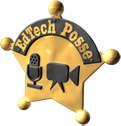When I first entered into using RSS, blogs and all the tools of Web 2.0, I remember saving a couple of posts from
Will Richardson in my Bloglines clippings. One was called
Shaking Society to the Core and the other was
What if I did this as a teacher. These posts spoke to the new nature of the web and how the potential for change is within reach.
I had a conversation this weekend with a friend of mine for the
STF. He is one of the administrative executives and was discussing some of the frustrations of the provincial body regarding communication and specifically the last round of provincial negotiations. A recent study on the process revealed that the voting habits of each local was a direct reflection of the position and attitude of their local president. During this round of bargaining, there was some level of misinterpretation and confusion regarding some of the key issues. In addition, the bargaining committee and administration was accused of not being transparent with all teachers.
So we talked about how these new tools might make things different. We wondered what things might have been like had all 11,000+ teachers had direct access to the information and more importantly had direct access to the discussion. While they may have had access to information, most of the information required explanations and discussions that seemed to be different in different jurisdictions. In collecting information traditional surveys are usually the form. If this information was posted, others could respond and react and engage in equal participation. There seems to be a desire on many to control the information. (If you haven't already read the links to the two posts, now would be a good time to read them).
As it was, there was an email sent out to many that included a number of communications with the
minister of learning. While this provided some unique and somewhat transparent information, without the ability for me to engage in the conversation, it was just information , not conversation. This is a clear picture of why the web is different now. This conversation takes place on many of the
blogs I read. Even though I don't comment on every post, the ability to do so is part of what makes it a conversation and community.
Locally, our school division just spent a full day with
Richard and Rebecca DuFour talking about Professional Learning communities. I created a
moodle site with a discussion area. I've asked teachers to comment on their thoughts and opinions engage in conversation. Teachers are beginning to understand they can speak freely and have professional conversations based on equal access to the information, in this case a day long workshop. This is one way to get a pulse on the feelings of our teachers. In time, more and more will participate and we'll hear from a variety of teachers, not just the ones who tend to be vocal in public settings.
I'll wrap up with a quote from the
Cluetrain Manifesto, which is freely
available online.
Dave Weinberger talks about how the web changes the way business works but I think you can apply these principles to any organization.
It is a public place. That is crucial. Having a voice doesn't mean being able to sing in the shower. It means presenting oneself to others. The Web provides a place like we've never seen before.
We may still have to behave properly in committee meetings, but increasingly the real work of the corporation is getting done by quirky individuals who meet on the Web, net the two-hour committee meeting down to two lines (one of which is obscene and the other wickedly funny), and then -- in a language and rhythm unique to them -- move ahead faster than the speed of management.
The memo is dead. Long live e-mail. The corporate newsletter is dead. Long live racks of ezines from individuals who do not speak for the corporation. Bland, safe relationships with customers are dead. Long live customer-support reps who are willing to get as pissed off at their own company as the angry customer is.
We are so desperate to have our voices back that we are willing to leap into the void. We embrace the Web not knowing what it is, but hoping that it will burn the org chart -- if not the organization -- down to the ground. Released from the gray-flannel handcuffs, we say anything, curse like sailors, rhyme like bad poets, flame against our own values, just for the pure delight of having a voice.
And when the thrill of hearing ourselves speak again wears off, we will begin to build a new world.
That is what the Web is for.
So I issue the challenge to the STF and other organizations, try opening things up and allow the web do what it can easily do to build trust, community and conversation. I'm not suggesting we burn the organization but the principle of openness and breaking down barriers to reveal our uncertainties and questions will be necessary for satisfying 21st century communication needs.





















